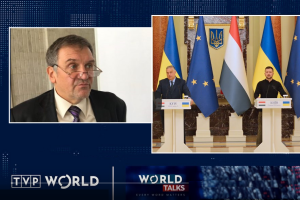Will U.S.-Ukraine relations survive the Obama years?

Almost 20 years ago, Sherman Garnett, the former deputy assistant secretary of state Russia, Ukraine, and Eurasia, listed the security measures that America had to take in Ukraine if it wanted to avoid a major regional crisis:
Yet the long-term character of Ukrainian-Russian relations is unsettled and potentially unsettling for Europe. The internal distractions that prevent Russia from exerting its power are not permanent. As they disappear, basic differences over the relations will have to resolve.… A stronger, more assertive Russia would have real levers of influence over Ukraine, especially, if the latter had not used its “breathing space” for sweeping political and economic reforms. (Sherman Garnett, Keystone in the Arch: Ukraine in the Emerging Security Environment of Central and Eastern Europe, 1997, p. 82)
The Obama administration, as well as its Republican predecessors, ignored early warnings of an emerging crisis in Ukrainian-Russian relations. Instead of using institutional ties and keeping their distance, American diplomats informally engaged in Ukrainian politics. As a result, before the end of Obama’s first term, Russia had the upper hand in Ukraine. The situation is getting worse, too, because America is now stuck in the role of mediating Ukraine’s squabbling political factions. It is a Sisyphean task, and is not making the region any safer.As Democrats returned to the White House in 2009, Obama’s foreign policy took on a familiar tone and was guided by many of the same technocrats who had populated the Clinton administration in the 1990s. They had dealt with the region before, and — especially in the case of Ukraine — were equipped with a post-Soviet playbook informed by Sherman Garnett and his contemporaries. Years earlier, Garnett had recommended establishing a trilateral platform for the United States, Ukraine, and Russia to discuss issues of mutual concern. Any talks should hinge on three principles: that the participant states be democratic and act in the interests of their people; that predictable behavior by each country made regional safety easier to create and manage, as a loose cannon could ruin the entire process; and finally, and most importantly, that two states could not collude against the third.
In 1996, Washington established a strategic partnership with Ukrainian president Leonid Kuchma. The bilateral commission, chaired by U.S. vice president Al Gore, concentrated on the gray zone of insecurity along the Russia–Western European fault, just ahead of the entry of Poland, the Czech Republic, and Hungary into NATO. The partnership did not work out well. Kuchma, looking to increase his personal power and wealth, broke Garnett’s first principle by shutting down independent media, political opponents, and his family’s economic rivals. For the United States, the last straw came via a leaked phone call in which Kuchma’s office was heard considering highly illegal arms deals with Iraq. The commission dissolved.
From that low point, American-Ukrainian relations bounced back, if only in a limited way. In 2003, Ukraine backed the Bush administration as it waged war in Iraq, sending a special brigade to help U.S. troops capture Kut Province, south of Baghdad. One year later, U.S. lawmakers saw the 2004 Orange Revolution as an opportunity to wrest Ukraine out of Russia’s hands, and supported Kyiv’s decision to join NATO by backing a proposed expedited process for its entry.
Russia looked on with growing resentment. For Putin, the push for Ukraine’s NATO membership was simply another example of American adventuring in Russia’s exclusive sphere of influence — the latest in a string of aggressions dating back to the Cold War. Russian authorities decided to guard themselves against “American unilateralism” by striking out, unpredictably and unilaterally — by breaking, almost to the word, Garnett’s second principle. Russia’s salvos included cutting off the flow of its gas lines into Ukraine, suspending the Treaty on Conventional Armed Forces, invading Georgia, and launching a massive cyberattack against Estonia.
By 2009, two of the three pillars of U.S.-Russia-Ukraine relations had crumbled
According to the opinions of experts from both Republican and Democratic camps, such as Ariel Cohen and Steven Pifer, by the time of Barack Obama’s inauguration in 2009, two of the three pillars of U.S.-Russia-Ukraine relations had crumbled. With wide concerns about Russian resurgence and low confidence among European allies, the new administration launched a “reset” policy to ease tensions. The next round of talks began in 2009 with the inaugural meeting of the U.S.-Ukraine Strategic Partnership Commission. That July, Vice President Joe Biden first signed the commission into being on his first state visit to Kyiv, a remarkably effective gesture designed to reassure Ukraine that America had not abandoned it.
Secretary of State Hillary Clinton, however, did not seem to share Biden’s good faith; the partnership she forged with Ukrainian president Viktor Yanukovych seemed too pragmatic, plainly aimed at getting Ukraine (and its stocks of highly enriched uranium) on board with Obama’s pet project on global nuclear security. Clinton’s warm missives to Ukraine came despite early warning signs that Kyiv might destroy its own democratic institutions. As Yanukovych’s government substituted a foreign policy in the national interest for one purely in the interests of wealthy businesses, it broke the first principle of Garnett’s playbook, just as Russia had broken the second.
At the same time, the Obama administration set aside the priority of Ukraine’s relationship with western Europe and concentrated on “resetting” bilateral U.S.-Russian relations. This strategy was successful in a limited way; for instance, the United States got Russia to play a constructive role in negotiations with Iran, but it did not relieve the new security challenges that Russia posed to many of the former Soviet republics.
The neglected regional dialogue led to a security vacuum that a resurgent Russia immediately filled. Intimidated by the Kremlin’s surging power and tempted by Russian gas and oil reserves, friends of Russia shot into power across the region. This happened not only in Ukraine, but up and down the continent’s East-West fault line: the left-wing presidency of Milos Zeman in the Czech Republic, the right-wing government of Viktor Orbán in Hungary, and the center-left governments of Robert Fico in Slovakia and Plamen Oresharski in Bulgaria. Each reoriented their foreign policy to build stronger ties with Russia. Only the institutional and legal framework of the European Union, and a dependency on European markets, kept these countries from unmitigated Russian vassalage.
Ukrainian authorities had very little wherewithal to take on Russia unaided. Certainly, neither the United States nor the European Union can be blamed for the poor economic showing and authoritarian misrule of the Yanukovych government, but the West’s mistakes made that backsliding all the easier.
Neither the U.S. nor the EU can be blamed for Yanukovych, but the West’s mistakes made Ukraine’s backsliding much easier
Under Secretary Clinton, the U.S. State Department’s policy toward Ukraine was heavily dependent on personal relationships with powerful members of Kyiv society who could offer exclusive information. Clinton’s recently disclosed emails have revealed a number of these direct links between Ukrainian oligarchs and top American diplomats:
Pinchuk, who has pledged more than $10 million to the Clinton Foundation in recent years, met with a top Clinton aide to speak on behalf of Ukraine’s strongman president and to try to soothe tensions with Washington over that country’s human rights record and its growing closeness with Russian President Vladimir Putin while resisting Europe. “I wanted to tell you that I met with Pinchuk who was asked by [then–Ukrainian president Viktor] Yanukovych to convey his strong continuing interest in integrating with Europe,” Melanne Verveer, the Clinton aide, wrote on Sept. 26, 2011, in an e-mail to Clinton. The message acknowledged that the Ukrainian leader had “antagonized all sides in the last few weeks,” partly because of an upcoming trial of an opposition political leader. Verveer wrote after her conversation with Pinchuk that the Ukrainians are “looking for a way to get beyond” the human rights fallout from the trial. (Tom Hamburger, Washington Post, October 5, 2015)
In that sense, it seems that little has changed since the uprising that forced out Yanukovych. Eighteen months after the strongman left Ukraine, investigative reporter-turned-parliamentarian Serhiy Leshchenko acknowledged that the American ambassador is consulted each and every time on government reshuffles. Another prominent journalist, Serhiy Rakhmanin, revealed that it was an American diplomat who insisted on striking a deal with Yanukovych over the interim government.
We would argue that true strategic partnership demands building permanent structures of communication not only between executives but, more importantly, between Congress and the Ukrainian parliament. This may help to calculate better cost-efficiency of the bilateral economic and security projects and have value for the American taxpayers money.
Strategic partnership demands lasting relationships between heads of state, but also — and more importantly — between parliament and Congress
Another area of concern has been when and how to stand between Russia and Ukraine when Russia has the upper hand. The 2008–9 recession, for instance, exposed Ukrainian dependency on Russian energy supplies. In 2010, the Kremlin used this weakness to impose on Ukraine an unequal agreement that extended Russia’s naval presence in Crimea until 2042. For Ukraine, the alternatives to Russian energy dependency offered by the United States and European Union — reverse gas flows and shale gas exploration — did not become priorities of the relations agenda. The reverse gas deals came to life only in 2014, when the European Union and the United States specifically endorsed those measures and gave their financial guarantees. Concerning shale gas exploration, U.S. contractors (notably, Chevron) turned a blind eye to Yanukovych’s personal interest in an energy deal; without Yanukovych in office and easing the way for Chevron, the shale deal fell through.
Garnett’s first principle, that all negotiations be fundamentally democratic, fell by the wayside in the energy crisis. Ukraine cannot withstand Russian pressure without Western energy, but if that energy comes loaded with private interests and me-first qualifications, it has no effect.
As far as military and security cooperation goes, the annexation of Crimea and the invasion in Donbas has placed Ukraine under the permanent threat of war. Regime change or another round of rewriting Ukrainian borders poses a serious threat. Not only is Ukraine’s sovereignty at risk, but the whole region faces the possibility of serious humanitarian catastrophe — and as the Syrian refugee crisis in Europe has shown, such catastrophes have no simple fix.
The question, then, is not only how to apply Garnett’s principles of diplomacy, it is whether commitment to rearm Ukraine and a maintain sanctions regime pays off with long-term stability and containment of Russia, or whether “strategic patience,” which presumes Ukraine’s fate as a Russian vassal, will buy the West some vital time to brace itself.
* * *
Olexiy Haran is a professor of comparative politics at the National University Kyiv-Mohyla Academy, academic director at the Ilko Kucheriv Democratic Initiatives Foundation, and an alumnus of the Wilson Center. His recent books include Ukraine, Russia, and the Failure of the Imperial Project (2011) and Ukraine in Europe: Questions and Answers (2010).
Petro Burkovskyi is the deputy head of the analysis and information department at the National Institute for Strategic Studies, and an alumnus of the George C. Marshall Center Program on Advanced Security Studies.
Cover image: White House photo by Pete Souza








